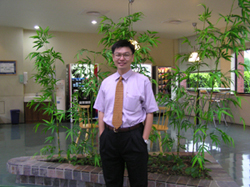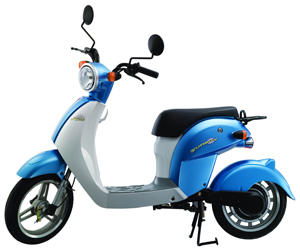Battery Association Head Optimistic About E-scooter Development in Taiwan
2009/10/09 | By
The government, academic organizations, research institutions, and private manufacturers are all working hard to develop electric vehicles (EVs) in Taiwan; and the island, thanks to its position as a global production base for high-quality internal-combustion scooters, large domestic market for powered two-wheelers (PTWs), mature battery and electronic industries, and strong policy support from the government, is seen as an ideal location for the development of electric scooter systems and products.
Some of that support is provided by the government-backed Industrial Technology Research Institute (ITRI), which set up a “Taiwan Battery Industry and Technology Development Union” in 1996 with the aim of raising the standards of the island’s battery industry and strengthening its international competitiveness. The union’s membership consists of more than 40 local battery-related firms and research institutions.
The Taiwan Battery Association (TBA) is one of the organizations that are helping to encourage the rapid development of the domestic e-scooter industry. It was established in 2006 to meet the island’s growing need for a strong organization to represent members’ interests and help map out future development directions, as well as to set up strategic and R&D alliances within the battery industry.
To accomplish its goals, the Association plans to work with other organizations such as the Industrial Development Bureau and the Bureau of Standards, Metrology and Inspection, both units of the Ministry of Economic Affairs, the Consumers Foundation, and the Environmental Protection Administration.
TBA president Alex Peng, who is also deputy director general of ITRI’s Material and Chemical Research Laboratories, is intimately concerned with the development of Taiwan’s e-scooter industry because he feels that such vehicles conform to the global trend toward environmental protection and can move people toward a more low-cost and efficient lifestyle.

The Era of E-scooters
“Late 2009 will mark the beginning of a new era for e-scooters in Taiwan,” Peng says, “as the government will begin a program of subsidies for all aspects of the industry instead of just the consumer or manufacturer aspects. To comply with the global trends toward carbon reduction, energy-saving technology, green production, and green consumption, the industrially advanced countries have been giving top priority to such issues as air pollution in cities and the conservation of dwindling petroleum resources. So those countries are striving aggressively to develop and popularize electric vehicles, and we’re happy that the Taiwan government announced an overall e-scooter promotion plan in 2008 and will begin subsidizing both consumers and manufacturers of e-scooters late this year.”
PTWs have long been the most popular means of short-distance transportation in Taiwan, Peng notes, and their emissions are a major source of pollution. With today’s high gasoline prices and the demand for emissions reduction, the government’s aggressive efforts to promote zero-pollution, energy-saving, low-noise e-scooters will bring much lower energy costs (about 15% those of traditional internal-combustion scooters) and less pollution; further, Peng says, e-scooters will be combined with mass transportation systems into “green transportation” networks in the near future.
Mature Environment
“Taiwan has already built up a mature, internationally competitive PTW industry with a full range of capabilities from design to manufacturing, system integration, and international marketing,” Peng comments. “Our well-established parts supply chains support vehicle assemblers in introducing high-quality, cost-competitive models. Almost all of Taiwan’s major PTW makers and system/parts suppliers have e-scooter-related technological and R&D capabilities, and some of them are ready to introduce commercialized products.”
“Furthermore, the government has commissioned research institutions, key vehicle makers, and battery firms to jointly map out testing standards for e-scooter safety and performance, recharging systems, and portable lithium-ion battery packs. And three organizations—the Automotive Research & Testing Center, ITRI, and Electronics Testing Center--have been asked to provide all necessary testing and consulting services. These efforts will help assure the highest quality and durability of e-scooters sold in Taiwan, protect the interests and safety of consumers, and further upgrade the technological level of the local e-scooter industry.”
Peng goes on to say that the government is requiring all e-scooter makers to establish after-sales service and maintenance networks around the island, and relevant provisions will have to be incorporated into the business plans that manufacturers submit to the government when applying for permission to operate. Products and factories will be subject to inspection, and any that fail to meet the related standards will not be included in the government’s subsidy program.
Hot Response
He is very happy, Peng says, with the strong response from local e-scooter and system-parts makers to the government’s policies, and he expects the island to become a major producer of e-scooters and other types of light EVs before very long. A group of makers of traditional combustion-engine PTWs have already jumped onto the e-bandwagon, he notes, including Kwang Yang Motor Co., (KYMCO), Sanyang Industry Co. (SYM), Motive Power Industry Co. (PGO), and Yamaha Motor Taiwan Co. More specialized firms are also scrambling to introduce e-scooters, such as the E-Ton Power Tech. Co. and EVT Co.
The potential of e-scooters is also attracting the interest of more and more lithium-battery producers, and Peng is urging the government to devote more resources to the promotion of the battery industry.
E-scooter Base
The experience of the local electronics industry, Peng says, shows that the great majority of local companies have strong development and manufacturing capability, but lack their own brands and so focus mostly on low-margin contract production. He urges local e-scooter makers to get rid of this thinking and upgrade themselves to meet the challenge of this fast-emerging market.
“The Ministry of Economic Affairs has promulgated a variety of incentives that encourage manufacturers of e-scooters to develop their own brands and value-added products,” Peng notes. “We hope that all of our developers and producers of major e-scooter parts and systems will take advantage of this great opportunity to cooperate more closely with e-scooter assemblers in deep-rooting core technology and competitiveness in Taiwan. We hope that Taiwan will become a global design, development, production, and marketing base for e-scooters in the near future.”

